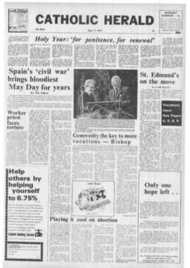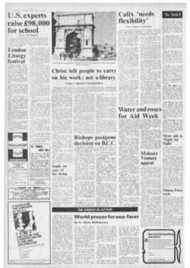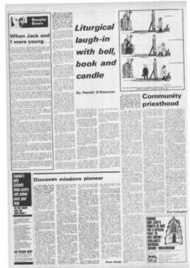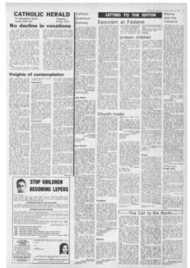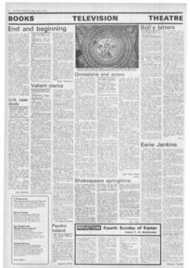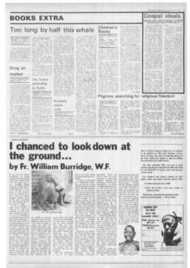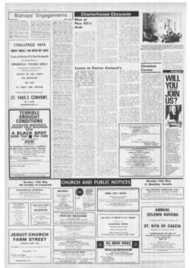Page 3, 11th May 1973
Page 3

Report an error
Noticed an error on this page?If you've noticed an error in this article please click here to report it.
Tags
Share
Related articles
Satire And Irony: Weapons Of An Afflicted Realist
German Observer Of Mass In G.b.
Gerald Barnett: Ex Pow And Svp
Ecclesiastical And Other !information
Iii Kriel .
Enter the Nobel rize Winner with a bouquet for the decisive parish priest
Frau Boll and the family were in the breakfast room. On the late
April day the buds of May seemed poised to leap from the ground; London and the hotel next to St. James's, Spanish Place were full of sunshine. Frau Boll said that before coming to England they visited Scotland. They enjoyed both countries very. much.
In the smokeroom, Heinrich B011 and I drank coffee and I questioned' him about his opinions of the Church, the world. Germany. novels. novelists, women and the younger generation.
Herr.Biill was awarded the Nobel Prize for l.iterature in 1972. He is
nearly the same age as his friend Alexander Solzhenitsyn: both were horn during the First World War Boll in 1917. the Russian in 1918.
One of the half-dozen most powerfully intelligent writers of his
generation. Boll has explored in his
hooks the Germany that in 1914 succumbed to the Kaiser and in
1939 to Hitler. The history of 20th century GerMany is distilled into a hotly of work that begins with the first major novel, Billiards at Half Past Nine and continues tnrough doyen titles to Group Portrait with Lady, just published in Britain.
Ile is a man of strong. some r»ighl say revolutionary, opinions, lie might he described as the unsen
timental German, kind but abrasively moral in his evaluation of people
and society. lie expresses his opinions without equivocation but with disarming modesty.
A burly man. with a sort of sehoolmasterish moustache, Boll
looks like what he is, the father of a family, but more Irish than German. Occasionally he quotes his sons.
And when he reluctantly passes a critical judgment on a person he otherwise admires he looks abashed
hs. himself. Mauriac, after all. was a great writer. he seems to say. but you asked mc.
I began by asking him the sort of question that only in these days
when reporters are compelled by the distortions time has brought to the trade to be midget inquisitors — would he tolerated. He answered. after reflection: he speaks quietly. What do you think of the future of the Church in the world as it now is?
I think the Church has no future if it does not get rid of the illusions held by our leaders. I refer to the Pope and to bishops.
I believe they have lost touch with the people. They seem to he irrele vant. They remain unchanged. Their clothes. their appearance, what we see. separates them from us: they appear different from us.
Too much stands between us and them. Those elaborate ceremonies, all that pomp, so little that is real.
And there are so many problems. The Church is not really a unit. It is
different in every country. has reached different stages of development. Problems have different emphases and I do not see our leaders facing up to that.
In your novel End of a Mission the parish priest, Fr. Kolb, seems to me to be an eminently sensible man. He is a German pastor, hardheaded, sceptical of theologians, and with very preheat views on the liturgy, fondesample. I've met ptiests like Fr. Kolb in Scotland, Ireland and England. Wouldn't you agree that he will contribute to the future of the Church, that he is an important man?
13611 smiled, rather widely.
I think he is the only important man. You know I'm bored by talk of the infallibility of the -Pope. .What concerns the people is the infallibility of the parish priest and, to a lesser degree. the bishop. the people never meel the Pope, and if they want advice it's the parish priest they see. His attitude is what is decisive. Yes, Er. Kolb is common to the Church, in Europe anyway and he is the important man.
In a way it is like the Army. Suppose the general empinanding is a very kind man. a very good man. like the Pope. His virtue doesn't matter if the corporal is not a nice man, The person with whom we are in contact is decisive.
Fr. Kolb said that "the vulgate could not be vulgar enough" for him. Were those Fr. Kolb's creator's sentiments?
Yes. Of course the Latin liturgy was beautiful. But the people did not understand it. The pity is, in too many places — Germany certainly — that the parish priests did not use their knowledge of the people's language in making the new vulgate.
The parish priest knows how the people talk but he has allowed the new liturgy to he loaded with appalling moral abstractions.
Do you think, then, that the ordinary clergy are not doing all they might?
I do. They understand the people's problems. People talk to them. They hear confessions. They know. But they do not use their knowledge.
Priests and Bishops may be trapped by their position. I suspect many bishops of wishing they were parish priests.
Heinrich 1)011 agreed, but said that Humanae Vitae had had a devastating impact upon the Church in German ■ , at least. In Rome, our bishops were liberals, in Germany, reactionary,
Myself, I do not believe abstract laws should play any real pan in sexuality. in relation to birth. It's a matter of taste, birth control, not morals.
We discussed the problems of housing for families all over Europe. In Glasgow I had seen high-rise blocks that made me cringe when I thought of a young mother trying to rear a family on any floor. Three or four children? Sometimes six, said B011.
Birth control, he continued, is not an abstract problem. I believe it is a matter of realities and love and the practical problems that come front them.
In End of a Mission, Fr. Kolb
rather tartly said that religion and theology were two different fields. Was that your opinion?
This time he grinned.
Yes. Theology is like physics: it has become more and more specialised. The theologians never come down to the people. They have vast concepts.The things that are serious to us arc the banal things of daily life.
Remember how we fasted before going to the Sacrament? How we worried, indeed were tortured if we felt we had not quite kept the rules.. It was so important. Yet they changed that overnight: without preparing us. without consulting us. I suppose it was of no importance to the thdologians. It was important to the people.
Was your religion a formative influence on your work and attitude as a writer?
I am not a Catholic writer. I am a Catholic who writes. Of course, my religion has had an influence. 1
remember reading the Ruskian poet Mayakovski: he said that his time as
an altar boy in the Orthodox Church had influenced him, I never was an altar boy but my reading of the Bi
ble, the liturgy and, I suspect. the litanies, has had a great influence on me.
1 also believe that Communists and Protestants are more repressed than Catholics. They deal, as I see it, with secondary things. We consider primary things. We consider primary things in our thoughts. Solzhenitsyn thanked you when he made his speech of acceptance of the Nobel Prize for Literature of 1970. Would you comment on Solzhenitsyn?
Since that speech, I met Solzhenitsyn in Moscow, It was a
good experience. Here in Western
Europe. he seems a very sombre figure. In person. he is cheerful. not relaxed — how could he he relaxed? — but normal, gay. not at all sombre.
The only other writer thanked by Solzhenitsyn, personally. was Mauriac. What do you think of Mauriac?
This time he almost guffawed.
I am happier with Greene and Waugh. Very happy, indeed, with Mr. Greene. I met him recently: he and his brother invited me to dinner in Scotland. But I have read his hooks and Waugh's since the war's end lfeae1 right nithf ththeem. There he is an aroma of fessionul about Mauriac — great as he is — that puts me off. His work is spiced with an aversion for sexuality that I dislike. I think (here his smile broadened) the trouble is that he and I had the same type of Catholic upbringing.
When' I was young, about 19, another Catholic writer meant much to me, and still does. I mean Chesterton: he is so witty and so elegant and so much more I can't quite think of,
Perhaps the quality you are trying to get is G.K.C.'s generosity?
That's it. Chesterton was generous.
I (eel that the younger generation, a/though many 'are leaving the Church seem to me to be realistic in their attitude — asking questions and demanding answers, perhaps renovating Christendom. What do you think?
Perhaps 30 years will puss before anyone knows. I believe. for example. that the younger generationput Will. Brandt into power in Germany. Young Catholics. And that is a good thing.
You know, in the past our bishops issued pastorals before elections telling the people how to vote. This time whole districts in the Rhineland that would have voted "Catholic" — that is C.D.U. went over to Dr. Brandt. It was a liberating election.
I spoke for the Chancellor. So did Garner Grass. So did many writers. When asked to speak I said I would do so if they allowed mc to speak in Catholic districts. They did.
The future, I suppose, is with young people, I know only my sons. But I know they are not impressed by the trimmings of the Church. They are interested in realities.
You know, I'd like to read of a cardinal who did not just marry top people — kings and counts. I'd like to read of one marrying a working man and his girl.
I think the young would like that too — at least in Germany. But more important, they arc asking questions and they will not accept abstract answers. They are a practical generation.
What about women?
Yes, I believe women can have an influence more important than any other group. You know for centuries and centuries the Church has been dominated and formed by celibate men. Women are closer to the realities of life: they have a more direct vision. And they are very practical.
I have noticed how much more pratical many nuns are than priests. I talk to nuns in Ireland and many Irish nuns are very grown-up in their approach to human problems.
You have a house in Ireland. I take it you like it there?
I like it very much. I went to Ireland first in 1951, after the war. I found it pleasant, relaxing after West Germany, where even a writer is always on the move. The people are friendly. Good people. good neighbours.
So 1 bought a house in 1957. before the prices,went up. My family like Ireland and we spend months there, sometimes as much as six months. wrote The Clown there and three or four of my other hooks.
Next month I'm off for America where McGraw-Hill will publish Group Portrait with Lady. When I return, I'm for Ireland — and some more writing.
IN: J. Igoe
(c) W. J. Igoe and Catholic Herald
1973.
blog comments powered by Disqus


